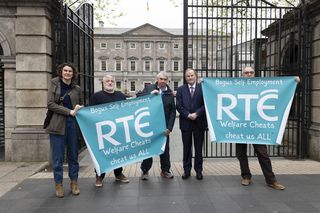Charlie Weston: If you haven't made a will yet, you are not alone
Making a will is not a guarantee of avoiding a family feud after deathbut there are financial advantages to having one.
If you have not made a will, you are not alone. Music legend Prince Rogers Nelson, better known to the world as Prince, died in April, and reports in the US indicate that he had not made a will.
According to the documents filed by his sister, Tyka Nelson, Prince died intestate. In the documents, Nelson asked for the appointment of a special administrator to manage her brother's estate, including the valuation of assets, continuation of Prince's business affairs, and the determination of heirs.
If this is correct, then he is not the only one. A lot of people put off writing a will. In fact, three out of four Irish adults do not have a will.
Making a will is not a guarantee of avoiding a family feud after death - the old saying has it that where there is a will there is a row - but there are financial advantages to having one.
Solicitor Susan Murphy of MakeMyWill.ie says making a will can be a very straight-forward process, and will cost less in the long-run than not having one.
If there is no will, then the succession rights that are outlined in the Succession Act 1965 come into play.
Where the person who has died was married, but had no children, then the spouse takes all. If the person was married and has children, then the spouse takes two thirds and the children take one third equally.
In the case of a single person (who has never married) and has no children, then the parents take all equally. If the parents are deceased, then the siblings take all equally, Ms Murphy said.
Even if these automatic succession rights mean your estate would be distributed the way you wish, there are additional financial advantages to making your will that you need to consider.
Where there is no will there is a strict order of entitlement outlined in the Succession Act, 1965 as to who can administer your estate. By you choosing the person to take on this role as your executor of your will, you are in control of appointing someone you can trust, who will administer the estate in a cost-efficient, time-efficient and sensible manner, Ms Murphy points out.
When you are making your will, your solicitor will explain potential inheritance tax liabilities for your beneficiaries. While children have a tax-free threshold of €280,000 each, beneficiaries such as siblings or nieces and nephews, can only inherit €30,150 and anything above this is taxed at 33pc. If you have no spouse or children, your next of kin could face huge, unnecessary tax bills.
Drafting a will ensures you give adequate consideration to the security of any dependants you may leave behind. Trusts can be put in place making sure your children are financially looked after by responsible people appointed by you.
Additional legal work often arises where someone dies without a will, particularly if there are substantial assets. This extra work would incur extra fees that you can guarantee would be a lot more costly than the fee for making a will, according to the solicitor.
There are no automatic succession rights for co-habitants. If you live with someone in a property owned by you in your sole name and you don't have a will, your partner would have no automatic right to remain in the property after you've gone. Under the Civil Partnership and Certain Rights and Obligations of Cohabitants Act 2010 your surviving partner could, however, make a claim against your estate by bringing an application to court, Ms Murphy says.
A will can be amended as your circumstances change, and will ensure peace of mind.
Join the Irish Independent WhatsApp channel
Stay up to date with all the latest news














